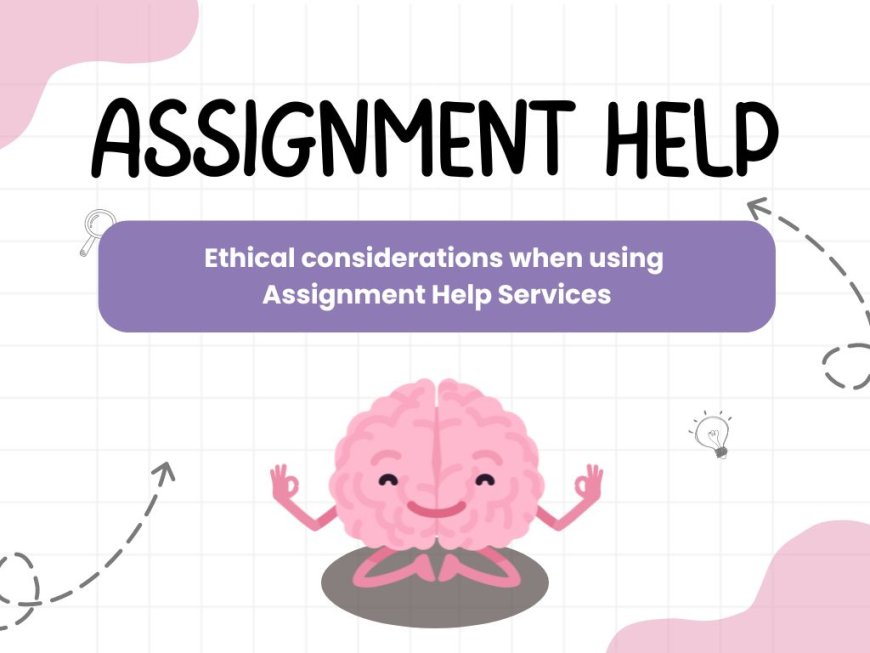Assignment Help : Ethical considerations when using assignment help services
In summary, while assignment help services can offer valuable support, ethical considerations must guide their use.

Using assignment help services can provide significant support in academic pursuits, but it also brings forth various ethical considerations that must be carefully navigated. The ethical use of such services is crucial for maintaining academic integrity and ensuring that the educational process remains genuine and fair. Here are the key ethical considerations to bear in mind:
1. Academic Integrity
One of the foremost ethical concerns with using Assignment Help services is maintaining academic integrity. Institutions expect students to produce original work that reflects their understanding and efforts. When students use assignment help services, they must ensure that the help received does not equate to submitting someone else’s work as their own. Instead, such services should be used to guide and enhance understanding, rather than to replace original student effort.
2. Proper Attribution
Proper attribution of sources and ideas is essential. When using assignment help services, it is vital to credit any ideas or material derived from these services correctly. This includes citing sources and acknowledging any direct input or substantial content provided by the help service. Failure to do so can lead to accusations of plagiarism, which is a serious academic offense.
3. Authenticity of Work
Assignment help services should be used to support learning rather than to complete assignments entirely. It is ethically important to ensure that the work submitted is reflective of your own understanding and capabilities. Using these services to merely produce a final submission without engaging with the content undermines the learning process and can lead to gaps in knowledge and skills.
4. Misrepresentation
Students must be honest about their use of assignment help services. Misrepresenting the extent of assistance received is unethical and can lead to serious academic consequences. For instance, claiming sole authorship of a piece that was significantly influenced or written by an external service misrepresents your academic capabilities and can violate academic codes of conduct.
5. Service Quality and Originality
Ethical concerns also arise from the quality and originality of the work provided by assignment help services. Students should ensure that the work they receive is original and not recycled or plagiarized from other sources. Many educational institutions have stringent plagiarism detection systems, and submitting work that is not original can result in severe penalties.
6. Respecting Institutional Policies
Different institutions have varying policies regarding the use of Assignment Help services. It is crucial to be aware of and respect these policies. Some institutions might allow for certain types of academic assistance, while others might have stricter guidelines. Understanding and adhering to these policies ensures that you remain within the ethical boundaries set by your educational institution.
7. Avoiding Dependence
Another ethical consideration is avoiding dependence on assignment help services. Relying too heavily on these services can inhibit personal growth and development. The goal of education is to develop critical thinking and problem-solving skills, which can be undermined if students continually use services to complete their assignments.
8. Ensuring Confidentiality
When engaging with assignment help services, students should ensure that their personal and academic information is handled confidentially. Ethical services should have robust privacy policies to protect students' information from misuse or unauthorized access. Students should be cautious and select reputable services that prioritize confidentiality.
9. Guidance vs. Completion
There is a fine line between receiving guidance and having an assignment completed for you. Ethical use of assignment help services involves seeking advice, feedback, or assistance in understanding complex concepts rather than having the service complete the assignment on your behalf. The assistance should aim to enhance your comprehension and skills rather than replace your work.
10. Fairness to Peers
Using assignment help services in a way that gives an unfair advantage over peers can be seen as unethical. If some students are using these services to gain grades or academic recognition unfairly, it creates an uneven playing field. Ensuring that the use of such services is fair and equitable is important for maintaining a level academic environment.
11. Learning Objectives
Ultimately, the purpose of academic assignments is to achieve learning objectives. It is essential to ensure that using assignment help services aligns with these objectives. If the help service is used to enhance understanding and provide support, it can be beneficial. However, if it detracts from achieving the learning goals, it is ethically problematic.
Conclusion
In summary, while assignment help services can offer valuable support, ethical considerations must guide their use. Maintaining academic integrity, ensuring proper attribution, and avoiding misrepresentation are crucial. Additionally, respecting institutional policies, ensuring originality, and avoiding over-reliance are important factors in ethical usage. Students must use these services responsibly to enhance their learning while adhering to academic standards and principles. By addressing these ethical concerns, students can make the most of assignment help services without compromising their educational values and personal integrity.

 george27
george27 










